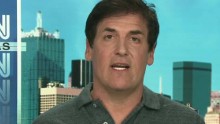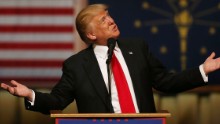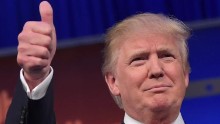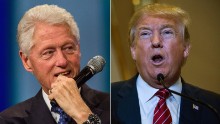begin quote from:
Donald Trump has delegates to clinch GOP nomination
| CNN | - |
(CNN) Donald Trump has the delegates to clinch the GOP presidential nomination, according to a CNN delegate count Thursday.
Donald Trump has delegates to clinch GOP nomination
Story highlights
- Donald Trump has now reached the threshold of 1,237 delegates to clinch the Republican presidential nomination
- He becomes the official nominee once delegates cast their votes on the convention floor in July
(CNN)Donald Trump has the delegates to clinch the GOP presidential nomination, according to a CNN delegate count Thursday.
While
Trump has had the nomination locked down for weeks, he has now reached
the threshold of 1,237 delegates with the help of previously uncommitted
delegates who now support his candidacy. A handful of states, including
the large prizes of California and New Jersey, will hold the final
primaries on June 7.
While
Trump will not formally accept the party's nomination until the
delegates cast their votes on the convention floor in July, crossing the
threshold effectively puts to rest any remaining suspense about the
possibility of a messy and contested convention. For months, drama and
tumult have rocked the Republican Party, as a fervent anti-Trump
movement launched a full-on onslaught to derail his candidacy.
But
the flurry of "Never Trump" activities, including a slew of negative
ads against Trump and efforts to draft a third-party candidate,
ultimately proved unsuccessful.
Speaking
at a news conference in Bismarck, North Dakota, Trump reveled in the
fact that he had clinched his party's nomination before Hillary Clinton.
"Here I am watching Hillary fight and she can't close the deal," Trump said.
Thursday also marks an extraordinary accomplishment for Trump.
The launch of his unlikely presidential campaign last
summer was met with widespread ridicule. His wholly unorthodox campaign
and rhetoric not only unsettled and alarmed GOP party leaders, but also
convinced many that the first-time political candidate would soon lose
steam. But if his campaign was initially underestimated by the party and
political media, it soon became clear that Trump's anti-establishment,
populist rhetoric had struck a nerve across the country.
"No
one in American history has moved from a June 16 announcement to a May
26 winning of a majority," former House Speaker Newt Gingrich, rumored
to be among the candidates on Trump's vice presidential short-list,
wrote on Twitter Thursday. "Trump's achievement is remarkable."
But
even as Trump and his campaign celebrate, they now have a more daunting
task ahead: defeating Clinton in the general election.
Trump
is up against historically high unfavorability ratings and faces
immense challenges as he looks to broaden his appeal and base heading
into November. The primaries revealed his weaknesses with constituencies
like women and minorities.
And
since essentially locking up the GOP nomination after the Indiana
primary, Trump has confronted various setbacks. He must still to win
over key GOP leaders, including House Speaker Paul Ryan,
and while he's begun to build out a national finance team, many major
party donors and financiers still remain opposed to his bid.
Trump
divulged part of his general election strategy at a rally Thursday in
Billings, Montana, just hours after crossing the 1,237 delegate
threshold.
"What I'm going to do is
I want to focus on 15 or so states, because we have to win, and I want
my energy to be put in the states where it could go either way," Trump
told the crowd in solidly Republican Montana, which Trump made clear was
not included in his list of swing states.
While
those states likely include traditional battleground states like
Florida, Ohio and Pennsylvania, Trump also said he will spend
significant chunks of time in states that have trended solidly blue in
recent presidential elections.
Trump
said he believes California and his home state of New York could be in
play, for example. And he argued that a "traditional Republican" nominee
would not put those states in play, as he believes he has.
The
Trump campaign did not respond to a request for comment asking for the
list of 15 states it plans to target in the general election.
Trump comes back to Washington this weekend to speak at the Rolling Thunder Memorial Day event.
Meanwhile,
Trump's campaign has been fraught with internal divisions — culminating
in the sudden departure of top campaign aide Rick Wiley this week —
that have highlighted the grave challenges Trump faces as he attempts to
transition into a more professional general election candidate.









































No comments:
Post a Comment